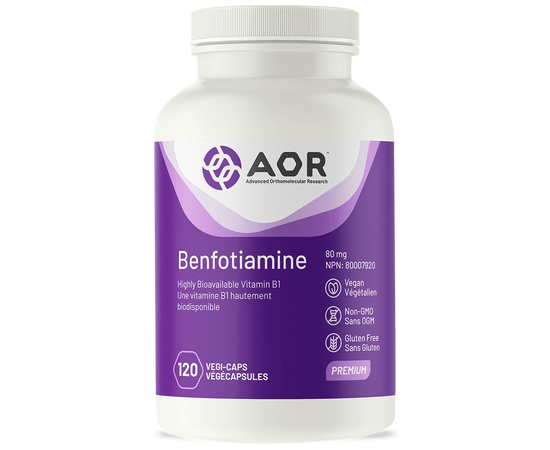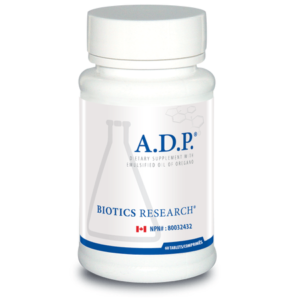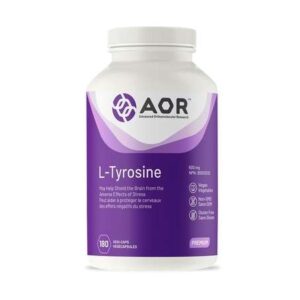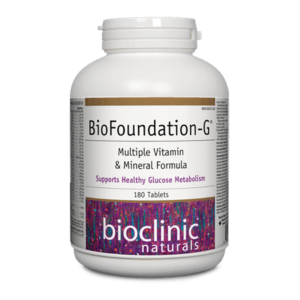Description
Benfotiamine AOR NPN 80007920
Details
Benfotiamine is a natural form of thiamin (vitamin B1) that has been proven to be 5 times more absorbable than regular thiamin and has better penetration through cellular membranes. The benefit of benfotiamine centers around its ability to block a harmful process in the body called protein glycation, which creates Advanced Glycation End-products (AGEs), a role that is not shared by thiamin.
AGEs are formed when cells are exposed to consistently high levels of blood sugar. They can lead to significant tissue and DNA damage, speed up the aging process, and ultimately lead to diabetic-related nerve damage in the hands and feet and damage to blood vessels in the eyes and kidneys. Benfotiamine has the unique ability to block the formation of AGEs and supplementation can help reduce nerve pain and improve nerve function. Many randomized, double-blind, placebo-controlled human trials have proven that benfotiamine powerfully supports nerve function in diabetic neuropathy.
AOR’s Benfotiamine is one of the few products to contain this active form of B1 in an evidence-based dose. With our modern high-sugar diet, millions are experiencing the many negative effects that excessive sugar has on the body. Those looking for protection against these negative effects such as accelerated cellular aging and nerve damage should consider AOR’s Benfotiamine.
AOR Advantage
Benfotiamine is a natural and bioavailable source of vitamin B1 and may be helpful in reducing the symptoms and complications of having poor blood sugar control. AOR’s Benfotiamine is one of the few products to contain this active form of B1 in an evidence-based dose.
Label InformationNPN
80007920
Discussion
Benfotiamine is a naturally-occurring form of thiamin (vitamin B1). Benfotiamine’s superior ability to penetrate cell membranes increases its bioavailability over conventional thiamin supplements. This allows for the use of benfotiamine to elicit all of the benefits of vitamin B1, such as the metabolism of carbohydrates, protein, and fat, in a highly efficient manner.
Guarantee
AOR™ guarantees that all ingredients have been declared on the label. Contains no wheat, gluten, corn, nuts, peanuts, sesame seeds, sulphites, mustard, soy, dairy, eggs, fish, shellfish or any animal by-product.
Adult Dosage
Take one capsule daily with food, or as directed by a qualified health care practitioner.
Cautions
Do not use if you are pregnant or breastfeeding. Persons with thiamin hypersensitivity should not take this product.
Main Applications
- Healthy aging
- Nerve function
- Thiamin deficiency
Disclaimer
The information and product descriptions appearing on this website are for information purposes only and are not intended to provide or replace medical advice to individuals from a qualified health care professional. Consult with your physician if you have any health concerns, and before initiating any new diet, exercise, supplement, or other lifestyle changes.
Supplement FactsServing Size: One Capsule
B1 Thiamin (Benfotiamine)
80 mg
Non-medicinal Ingredients: microcrystalline cellulose and sodium stearyl fumarate. Capsule: hypromellose.
Research Facts
Supports Nerve and Eye Function in Diabetics
This six-month randomized, controlled clinical trial of patients with type 1 and type 2 diabetes with no retinopathy or mild to moderate non-proliferative retinopathy assigned to twice daily consumption of placebo or a novel, multi-component formula containing xanthophyll pigments, antioxidants, and selected botanical extracts including benfotiamine. At six months, subjects on active supplement compared with placebo had a significantly better visual function on all measures (p values ranging from 0.008 to <0.0001), significant improvements in most serum lipids (p values ranging from 0.01 to 0.0004), hsCRP (p=0.01) and diabetic peripheral neuropathy (Fisher’s exact test, p=0.0024)
https://bjo.bmj.com/content/100/2/227.full
Counteracts Smoking-Induced Vascular Dysfunction
In this study, 20 healthy subjects were studied in a randomized, cross-over, and investigator-blinded design. On one day, the vascular function was measured after an overnight fast and 20 minutes after smoking one cigarette. On another day, the same procedure was applied following a three-day therapy with benfotiamine given orally on days one, two, and three. On each test day, the vascular function was assessed in the fasting state (around 07:00 AM) as well as 20 min following smoking one standard cigarette. Venous blood was drawn after each vascular function measurement. Smoking alone induced a significant decrease in flow-mediated dilation of -50%**, an effect which was significantly reduced by pretreatment with benfotiamine to -25% *§ (**P< 0.001, *P < 0.05 after smoking versus before smoking, §P <0.05 “S + BT” versus “S”)
https://www.hindawi.com/journals/ijvm/2012/968761/
Protects Against Memory Impairment
Study 1:
In this study, male Syrian mice were divided randomly into 13 groups and were administered different doses of intraperitoneal in order to induce diabetes. At the end of the experiments (after three weeks), the fasting blood glucose test was determined by collecting blood from the orbital sinus by Pasteur pipette after anesthesia. The blood glucose of more than 200 mg/dl was considered diabetes and the animals that did not become diabetic were excluded from the study. Two days after STZ injection, mice were divided randomly, and citicoline and/or benfotiamine or normal saline were administered once daily for twenty days. The object recognition task (ORT) was performed on day 19, and the passive avoidance test (PAT) was carried out on days 20 and 21. In diabetic mice, administration of benfotiamine and citicoline, given separately for three weeks, significantly and dose independently improved cognitive and STM and LTM deficit in both paradigms, ORT and PAT. Because of the high mortality rate during the study in mice treated with higher doses of citicoline, it can be concluded that citicoline at lower doses of 50 and 100 mg/kg can have a better effect on memory, especially when added to benfotiamine. The results that we have obtained after the individual administrations of benfotiamine or citicoline match with previous reports. Memory improvement by benfotiamine and citicoline is thought to be due to several factors. Thiamine is thought to affect memory function through several mechanisms such as the cholinergic pathway, reducing free radicals and cerebral oxidative stress, glutamate uptake, and managing glucose metabolism in the brain.
https://www.ncbi.nlm.nih.gov/pmc/articles/PMC7006985/
Study 2:
In this study, it was examined whether benfotiamine and fursultiamine have beneficial pharmacological effects on the behavior of APP/PS1 mice. Mice were randomly assigned to six groups, with n = 16 per group. Three of these groups received different doses (50, 100, 200 mg/kg/day) of benfotiamine. The Morris water maze test was used to analyze the memory and cognitive function of the mice. In this test, it was found that significantly improved spatial memory was shown in crossing times. The researchers found that benfotiamine dose-dependently improved the spatial memory of the mice involved.




